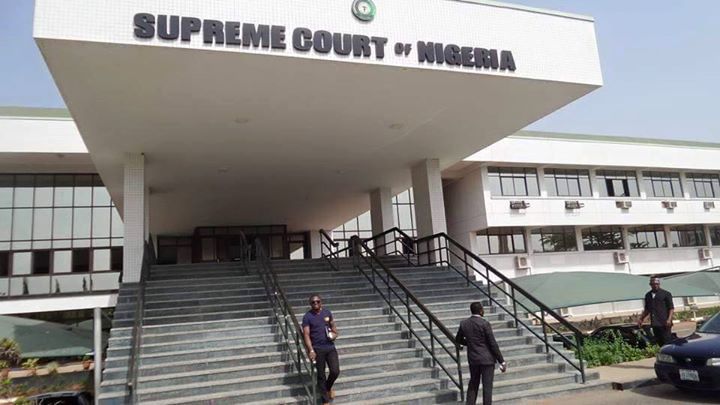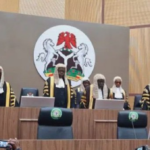Mr Justice Musa Dattijo Muhammad retired from the Supreme Court of Nigeria last month. He chose not to walk into the sunset of his distinguished judicial career in silence as others before him had done. He did what no jurist in our country had done. To borrow the expression coined by the late ace British television interviewer, David Frost, he gave full rein to a cascade of candour that shocked the nation as much as it did his former colleagues on the highest judicial bench.
He spoke up about the unacceptable state of the apex court that hobbles its capacity in justice delivery system. He voiced what he had worried him all these years. The apex court has only 10 justices. Can anyone find a good reason why the vacancies have not been filled? Yes, Muhammad said this is deliberate. Deliberate too is the reluctance to appoint a justice for the south-east geo-political zone.
If we did not know before now that the temple of justice has become a poisoned chalice to those who seek justice, we now know. Muhammad spoke as an insider. That there is so much wrong with the administrative structure in the Supreme Court beggars belief. We thought it was a solid institution, unassailable by the virulent virus also known as politicians. We were wrong. It is an institution in need of rescue to enable it to properly perform its constitutional functions.
Justice Olukayode Ariwoola, the chief justice of Nigeria, described Muhammad as “one judicial officer that could be blunt, even to a fault; and is never known to be afraid to say things the way they are; and also never shies away from calling a spade by its name, irrespective of whose ox is gored.”
China’s ICT infrastructure projects promoting digitisation in Nigeria
Delayed justice: NICArb to hold conference, advocates improved alternative dispute resolution
Muhammad lived fully up to that reputation in his valedictory speech at the occasion at which he formally took leave of his colleagues. He has now hung up the judicial robe he wore for 47 years. Bluntly he spoke, aware that an ox or two would be gored: “My lords, distinguished invitees, ladies, and gentlemen, it is obvious that the judiciary I am exiting from is far from the one I voluntarily joined and desired to serve and be identified with. The institution has become something else.” Something else, as in the shadow of itself.
In his 47years on the bench the eminent jurist saw the good, the bad and the unacceptable in our nation’s most critical institution to democracy, the rule of law and as a protector and a refuge for the poor, the weak, the oppressed and the downtrodden. In that time, he witnessed the systemic weakening and the desecration of the temple of justice by both outsiders and insiders. He witnessed judicial decisions and legal interpretations that made first year law students wince because they were blatantly at variance with extant laws; and he witnessed sordid attempts to bend the arc of justice towards the whims and the caprices of our political leaders.
It is scandalous that the chief registrar earns more than the justices of the Supreme Court. The chief registrar provides clerical and administrative support to the court and the justices. The chief registrar earns N1.2 million a month; a justice of the Supreme Court earns N751,000 a month and, the mother of scandals, the CJN earns N400,000 a month. As Muhammad rightly put it, “The salary of a justice, curiously, drops rather than increases when he gets the added responsibility of being a CJN.” It is not in the natural order of human progress that the higher you go the lower you are compensated. The salary differentials have no logical explanation. I suppose this is what Ndigbo describe as a servant being greater than the master.
In 2016, DSS conducted a gestapo raid on the residences of some justices of the court of appeal and the Supreme Court. The Buhari administration ostensibly was responding to allegations of corruption in the higher benches. It did not excuse the wretched treatment of the affected justices. Political intimidation of an institution such as the judiciary is a dangerous weapon that ill-serves the society. The truth about the mid-night raid was the president’s ambition to intimidate the bench into doing his will, no matter how much it went against the law and the rule of law.
With the raids as his weapon of choice, Buhari avenged himself by getting rid of the CJN, Justice Onnoghen. He replaced him with a man outside the system in the apex court, Justice Ibrahim Tanko Muhammad. Nemesis shamed the president because Muhammad treated his colleagues so poorly that, according to the Justice Dattijo Muhammad, “in 2022, a letter signed by all the justices of the Supreme Court, including the current CJN, the aggrieved protested against the shabby treatment meted to them by the head of the court and the chief registrar.”
The event made Muhammad’s continued headship of the apex untenable. He “disengaged ostensibly on health grounds” but thanks to his benefactor he will not count kobo again for the rest of his life.
There is no excuse for the poor funding of the judiciary. Of the three branches in our system of government, the judiciary is the most important and the most critical to how our country is run by the politicians. It ought to be fully protected from the intrusion of politics with its capacity to poison and desecrate an institution. I recall that Justice Tank Muhammad once spoke of his being forced to go out with a begging bowl, asking the executive branch to do the needful. The consequence of this inexcusable reluctance to fully give the justices their due is that the “justices and officers welfare and the quality of service the judiciary render have continued to decline.” And this, to our collective detriment as a nation.
That the judiciary is the last hope of the common man is not an empty slogan. It is the only branch of government capable of preventing incipient dictatorship and the cynical breaches of law and the rule of law by the lords of the political manor and their wealthy business compradors. The weakening of the judiciary by means foul is the weakening of our government at all levels. This is elementary but as long as it serves the whims and the caprices of our political leaders, so long will it continue, and so long will the nation continue to shed tears for the absence of governments that govern in law and in fact.
When people speak the truth about what is going wrong in an important institution, they do so with the conviction that when you speak the truth you not only shame the devil, but you also clear the way for the angel to do the needful. Muhammad has done his duty. On the bench, he respected tradition and kept his lips sealed. Freed from that tradition, he believed he ought to act in line with his conviction that there is a time to keep quiet and a time to speak up. He has challenged our political leaders to rise up to the challenges of righting the wrong in the judiciary at all levels, from the lowest court to the highest court. The supreme court justices must be fully protected against the virus of political infiltration and corruption. Their wretched salaries and welfare make them vulnerable to the corrupting influence of our politicians.
Muhammad has spoken but he has spoken to the deaf. The men and women who could take up the challenge will not because as the late premier of the defunct Northern Region, Sir Ahmadu Bello once put it, no one accepts an invitation to commit suicide.

 Join Daily Trust WhatsApp Community For Quick Access To News and Happenings Around You.
Join Daily Trust WhatsApp Community For Quick Access To News and Happenings Around You.


